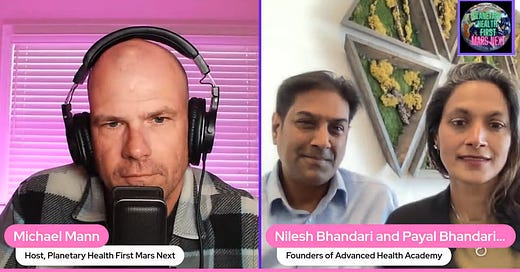Tachyons, Short soundbites, Takes, Pulses from the show….
Structural Issues in Healthcare System
So structurally, I guess, with your integral functional medicine, you have a approach where you're not, I guess, blocked by traditional medicine. What is it currently? What's the blocking of letting the right practice happen right now? Structurally, that has to change. Structurally, clinicians are at the mercy of payers. And with payers, they are incentivized to demonstrate people are very, very sick. And that insurances are predominantly, you get a higher reimbursement when you push for drugs and procedures, right? But that isn't always aligned with what the patient needs to actually understand what's going on with them and get them better, right? And so that's one thing that's an issue. We also just have, we've had an explosion of data where we've got lots and lots of diagnostic tests. We've got lots and lots of like invasive solutions, but that has not led to people actually driving better health outcomes. Right. We've got massive epidemics and so many chronic complex diseases that are predominantly lifestyle based. And so if you look at this paradigm, we keep focusing on more diagnostic testing, more of these like general population based solutions. But there is a fundamental mindset that has to shift,
AI and Data: Transforming Healthcare Potential
And I think in actuality with automation and AI, we can drive better data insights if we do it intelligently. And so I think that's really where I would like to, or some of this conversation, because I think it has the biggest impact for the healthcare industry at large. And that's really going through, we'd like to go through a little bit of the case studies, Dr. Benari, with your practice, some of those insights, those journeys without mentioning names, but would that help give the insight of that root cause where you get to? For sure. I think it's about how do you take data and make it come to life? Because that's really what each one of us are dealing with where we're all patients and lab tests are done every day, thousands and thousands. And so probably in someone's lifetime, they're going to have labs done in at least in the United States. And so when you don't actually understand what your data means, and you're fully dependent on someone else to figure it out, there is a skewed perspective because you are the expert of your story. And when the model is designed where there's not enough time to hear out a person's story, and the data really kind of brings a lot of information to the surface, we lose sight of what does this really mean and what do I do with it, right? And I think we are in an interesting era where we can harness that data with technology to really drive amazing insights that can transform people's lives, but also fundamentally shift healthcare from being reactive, terrifying, anxiety provoking, treating humans like you're still a mystery here's a diagnosis, here's what we think your solution is.
Complexity and Individuality in Diagnoses
I mean, the other part of this, to be clear, is you spent the last. more than a dozen years, 15 years, really focused on very complex chronic diseases where these have been medical mysteries that you've been dealing with. And as part of that process, it's not as simple as, oh great, my simple example, LDL cholesterol level is high and everything else is sort of looking normal. Great, that's a very simple or a more simplistic approach. But when you've got many issues How do you blow it together? And I think that's part of, when you talk about freaking out inside, part of it is this medical mystery and this scientific mind you've got to dig in. And you've got case after case after case where it's, But I mean, let's take an example, right? If you really think about most of us, we're all complex, right? We've got these complex stories and we're presenting. So, you know, you've got somebody who comes in and says, I have headaches all the time. And the woman says, yeah, and they happen to come around my period. And I also end up feeling really tired and I can't sleep and I'm having hot flashes. That's like a lot of different things going on. So we're trained to be like, just narrow it down to one thing, pick that thing, and then boom, the solution is tied to that one major description. But if you step away as a scientist, you say, that doesn't make sense. Humanly, we want to reduce. That's how we operate, because it gives us a focus point. And then we hold on to that focus point. And we say, OK. Oh, all my symptoms are menopause because I'm 48 years old and that's what fits all the buckets. But everybody is labeled as menopause for having hot flashes and feeling tired and not sleeping well and being moody. You're like, and the solution is just this. And I think that coming from that perspective, being like, no, no, This is complex.
The Faults in Generalized Medical Diagnostics
But the approach is that more than 40% of the time, the diagnosis is incorrect, and that the solutions are designed for the general population, not for the human. And we really don't differentiate between sex, ethnicity, and race. And that is a big issue because people's metabolisms and how they operate, they are expressed fundamentally different. And we are in an era where science has actually uncovered so much of that data, but research and practical usage don't really come together very effectively and it takes decades. And so I think that when we can take those case studies to actually make it come to life, then we each have an aha moment and we feel empowered with how the data is actually making us feel safe versus right now you see the data and you don't know what to do with it and it scares you. I'll just give a simple example on that. So the most common issue that we face across sort of the US, a lot of chronic diseases, but one is the top two I think about are cardiovascular disease or now called cardiometabolic disease for good reason, as well as diabetes. And right now, by and large, if we say LDL cholesterol levels are high, we're basing that on a curve that is based on a national majority population. That is based on Northern Western European descent. Male eventually applied to females, which took a long time for that to happen, but at least that's now happened in the last couple of decades. Well, when we look at that curve, that's based risk profiles for that, call it ethnicity at the end of the day. When we look at other ethnicities, we know the science has shown, clinically proven, that the risk profiles are different for someone of different racial ethnic and ethnic backgrounds.
Find us & follow us:
😍 💕 🌍 💜 😊 🚀Most important thing is to subscribe to keep updated with our latest podcasts, newsletters...etc.
Planetary Health First Mars Next is a reader-supported publication. To receive new posts and support my work, consider becoming a free or paid subscriber.
We might just lift off to Mars if the orbit is right! 😍 💕 🌍 💜 😊 🚀
In love & kindness,
Michael Mann, (😍 💕)
Disclaimer: the views of the participants are their own only and do not reflect the views of other participants, participants' organizations, etc or Planetary Health First Mars Next or the Host…….
This podcast is for informational purposes only and should not be considered professional or medical advice.
In addition if there are any mistakes or facts that need to be corrected please feel free to reach out to us so we can correct any statement.
Understand we are a self published entity and do the best we can.
If you have an idea or have an inspiring topic or know anyone that would be a great guest for our show please reach out to info@planetaryhealthfirstmarsnext.org












Share this post